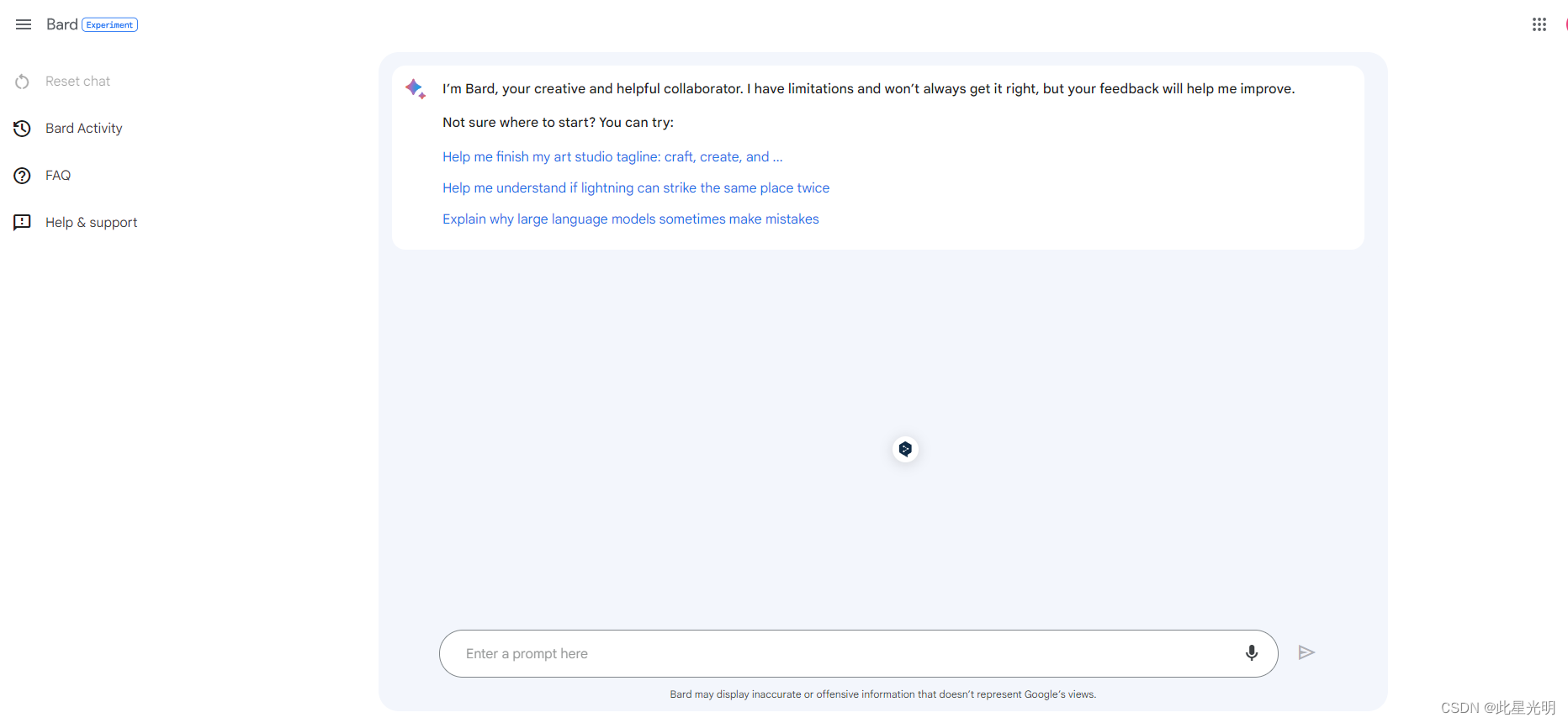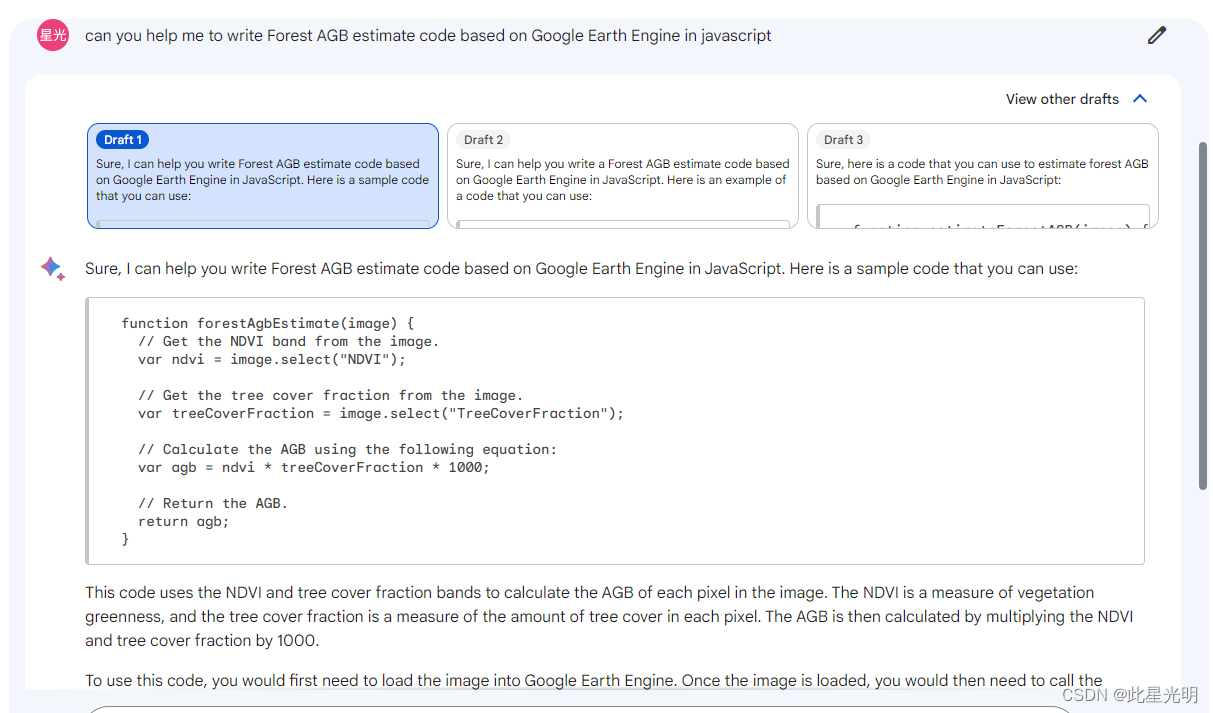上一篇写了注册百度和Google,最后还是谷歌的速度战胜了,最终在长达3天的等待中得到了拿到了测试名额。
成功注册bard后,映入眼帘的就是提示下面的话,我做了翻译:
Bard is an experiment
As you try Bard, please remember:
Bard will not always get it right
Bard may give inaccurate or inappropriate responses. When in doubt, use the “Google it” button to check Bard’s responses.
Bard will get better with your feedback
Please rate responses and flag anything that may be offensive or unsafe.
巴德是一个实验
当你尝试巴德时,请记住:
巴德并不总是正确的
巴德可能会给出不准确或不适当的反应。当有疑问时,请使用 "Google it "按钮来检查Bard的反应。
巴德会因为你的反馈而变得更好
请对回应进行评级,并标记任何可能具有攻击性或不安全的内容。

我是巴德,你的创意和乐于助人的合作者。 我有局限性,不会总是做对,但您的反馈将帮助我改进。
不知道从哪里开始? 你可以试试:
当然我们首先用中文问问题:

答案是否定的,所以这里我们只能使用英文提问和接收回答。
这里我们提出了第二个问题:
can you help me to write Forest AGB estimate code based on Google Earth Engine in javascript?
回答如下图:这里给出了3个参考项,而不是像chatgpt的一个选项 
答案1:
Sure, I can help you write Forest AGB estimate code based on Google Earth Engine in JavaScript. Here is a sample code that you can use:
function forestAgbEstimate(image) {// Get the NDVI band from the image.var ndvi = image.select("NDVI");// Get the tree cover fraction from the image.var treeCoverFraction = image.select("TreeCoverFraction");// Calculate the AGB using the following equation:var agb = ndvi * treeCoverFraction * 1000;// Return the AGB.return agb;
}
This code uses the NDVI and tree cover fraction bands to calculate the AGB of each pixel in the image. The NDVI is a measure of vegetation greenness, and the tree cover fraction is a measure of the amount of tree cover in each pixel. The AGB is then calculated by multiplying the NDVI and tree cover fraction by 1000.
To use this code, you would first need to load the image into Google Earth Engine. Once the image is loaded, you would then need to call the forestAgbEstimate function on the image. The function will return a new image that contains the AGB for each pixel.
Here is an example of how to use the code:
var image = ee.ImageCollection("LANDSAT/LC08/C01/T1_SR").filterDate("2020-01-01", "2020-12-31").first();
var agb = forestAgbEstimate(image);
agb.visualize();
This code will load the Landsat 8 image collection from January 1, 2020 to December 31, 2020 and then calculate the AGB for each pixel. The AGB will then be visualized using a color ramp.
首先,第一个回答是错误的,主要原因是,这个数据集中根本没有所谓的 TreeCoverFraction 波段
其次使用这个代码是无法进行的,缺乏明显的数据集和波段信息参与函数的遍历问题。
答案2:
Sure, I can help you write a Forest AGB estimate code based on Google Earth Engine in JavaScript. Here is an example of a code that you can use:
function forestAGBEstimate(image) {// Get the NDVI and Fractional Vegetation Cover (FVC) values from the image.var ndvi = image.select('NDVI');var fvc = image.select('FVC');// Calculate the Normalized Difference Vegetation Index (NDVI) and Fractional Vegetation Cover (FVC) values.var ndvi_value = ndvi.gt(0).and(ndvi.lt(1)).mean();var fvc_value = fvc.mean();// Calculate the Forest AGB estimate.var forest_agb_estimate = ndvi_value * fvc_value * 1000;// Return the Forest AGB estimate.return forest_agb_estimate;
}
This code uses the NDVI and FVC values to calculate the Forest AGB estimate. The NDVI is a measure of the greenness of vegetation, and the FVC is a measure of the amount of vegetation cover. The Forest AGB estimate is calculated by multiplying the NDVI and FVC values by 1000.
To use this code, you can first import the Google Earth Engine API into your JavaScript code. Then, you can create an instance of the ImageCollection class and pass the image that you want to analyze to the constructor. Finally, you can call the forestAGBEstimate() function on the image collection to get the Forest AGB estimate.
Here is an example of how to use this code:
var image = ee.ImageCollection('LANDSAT/LC08/C01/T1_SR').filterDate('2020-01-01', '2020-12-31');
var forest_agb_estimate = image.map(forestAGBEstimate);
This code will create a new image collection that contains the Forest AGB estimate for each image in the LANDSAT 8 collection. You can then use this image collection to analyze the Forest AGB for different areas or time periods.
第二个回答同样有问题,主要的原因是原始波段中并没有计算的NDVI 和FVC波段,所以无法实现代码的运行,提供的函数缺乏中间环节,所以结果是无法运行的。
答案3:
Sure, here is a code that you can use to estimate forest AGB based on Google Earth Engine in JavaScript:
function estimateForestAGB(image) {// Get the NDVI values from the image.var ndvi = image.select('NDVI');// Get the fraction of canopy cover from the image.var fcover = image.select('FractionOfCanopyCover');// Get the leaf area index from the image.var lai = image.select('LeafAreaIndex');// Calculate the forest AGB using the following equation:var agb = ndvi * fcover * lai;// Return the AGB values.return agb;
}
To use this code, you will need to first create a Google Earth Engine account and then sign in to the Google Earth Engine website. Once you are logged in, you can create a new project and then import the code above into the project. You can then use the code to estimate forest AGB for any image that is available in Google Earth Engine.
Here is an example of how to use the code:
// Import the code.
var estimateForestAGB = require('ee/functions/estimateForestAGB');// Get the image that you want to estimate AGB for.
var image = ee.ImageCollection('LANDSAT/LC08/C01/T1_SR').filterDate('2020-01-01', '2020-12-31');// Estimate the AGB for the image.
var agb = estimateForestAGB(image);// Display the AGB values.
Map.addLayer(agb, {min: 0, max: 1000}, 'AGB');
This code will display a map of the AGB values for the image. The values will be displayed in a color ramp, with the lowest values in blue and the highest values in red.
thumb_upthumb_downrefresh
more_vert
第三个回答除了上面共有的问题之外,主要是目前并没有科学依据采用上面的公式进行计算,总体来说代码的拼凑和叠兑无法实现整个代码的输出,虽然三种回答但都没有一个正确的,特别是问一些很专业的问题,而且无法像chatgpt给出合并在一起的代码。所以这里我们建议让她给出一个简单的回答,这里值得注意的是第二次的回答,会将后面的回答折叠起来让她写一篇博客文章:
答案1:
Google Earth Engine is a cloud-based platform that provides access to satellite imagery, weather data, and other geospatial data. It can be used to monitor and track changes to the Earth's surface, and to study a variety of environmental and social issues.
Google Earth Engine was launched in 2010, and it has been used by scientists, researchers, and governments around the world to track deforestation, monitor water resources, and study climate change. It has also been used to create educational tools and to promote environmental awareness.
One of the most powerful features of Google Earth Engine is its ability to process large amounts of data quickly and easily. This makes it possible to track changes to the Earth's surface over time, and to study complex environmental issues.
Google Earth Engine is a powerful tool that can be used to make a difference in the world. It is being used by scientists, researchers, and governments to track deforestation, monitor water resources, and study climate change. It is also being used to create educational tools and to promote environmental awareness.
Here are some of the ways that Google Earth Engine is being used to make a difference:
- Tracking deforestation: Google Earth Engine is being used to track deforestation in the Amazon rainforest. Scientists are using the data to identify areas that are at risk of deforestation, and to develop strategies to protect the rainforest.
- Monitoring water resources: Google Earth Engine is being used to monitor water resources around the world. Scientists are using the data to track changes in water levels, and to identify areas that are at risk of drought.
- Studying climate change: Google Earth Engine is being used to study climate change. Scientists are using the data to track changes in the Earth's atmosphere, and to identify the effects of climate change on the planet.
- Creating educational tools: Google Earth Engine is being used to create educational tools about the environment. Scientists are using the data to create interactive maps and visualizations that can be used to teach people about the Earth's environment.
- Promoting environmental awareness: Google Earth Engine is being used to promote environmental awareness. Scientists are using the data to create public-facing websites and apps that can be used to educate people about the Earth's environment.
Google Earth Engine is a powerful tool that can be used to make a difference in the world. It is being used by scientists, researchers, and governments to track deforestation, monitor water resources, and study climate change. It is also being used to create educational tools and to promote environmental awareness.
thumb_upthumb_downrefreshGoogle it
more_vert
答案2:
Here is a blog about Google Earth Engine:
Google Earth Engine is a cloud-based platform that provides access to satellite imagery and geospatial data. It is used by scientists, researchers, and developers to monitor and analyze changes on Earth's surface.
Google Earth Engine was launched in 2010 and has since become one of the most popular platforms for Earth observation. It is used by over 100,000 users from over 180 countries.
Google Earth Engine offers a variety of features, including:
- Access to satellite imagery and geospatial data
- Tools for analyzing and visualizing data
- The ability to collaborate with other users
- The ability to share data and results
Google Earth Engine is a powerful tool that can be used to address a variety of challenges, including:
- Climate change
- Deforestation
- Natural disasters
- Urban planning
Google Earth Engine is a free and open platform. Anyone can sign up and start using it. It is a valuable tool for anyone who wants to monitor and analyze changes on Earth's surface.
Here are some examples of how Google Earth Engine is being used:
- Scientists are using Google Earth Engine to monitor deforestation in the Amazon rainforest.
- Researchers are using Google Earth Engine to track the spread of the Zika virus.
- Governments are using Google Earth Engine to monitor agricultural yields.
- Non-profit organizations are using Google Earth Engine to track the progress of development projects.
Google Earth Engine is a powerful tool that is making a difference in the world. It is being used to address some of the most pressing challenges facing our planet.
If you are interested in learning more about Google Earth Engine, you can visit the website or sign up for a free account.
答案3:
Google Earth Engine is a cloud computing platform that provides access to satellite imagery and other geospatial data. It allows users to analyze this data to track changes in the environment, monitor natural disasters, and plan for sustainable development.
Google Earth Engine was launched in 2010 and has since been used by over 1 million people in over 180 countries. It has been used to track deforestation in the Amazon rainforest, monitor the effects of climate change, and map the spread of disease.
Google Earth Engine is a powerful tool that can be used to make a real difference in the world. It is free to use and open to anyone with an internet connection. If you are interested in learning more about Google Earth Engine, I encourage you to visit the website and explore the resources that are available.
Here are some of the things that you can do with Google Earth Engine:
- Track changes in the environment: Google Earth Engine can be used to track changes in the environment, such as deforestation, desertification, and the melting of glaciers.
- Monitor natural disasters: Google Earth Engine can be used to monitor natural disasters, such as floods, earthquakes, and hurricanes.
- Plan for sustainable development: Google Earth Engine can be used to plan for sustainable development, such as by identifying areas of land that are suitable for agriculture or renewable energy projects.
Google Earth Engine is a powerful tool that can be used to make a real difference in the world. It is free to use and open to anyone with an internet connection. If you are interested in learning more about Google Earth Engine, I encourage you to visit the website and explore the resources that are available.
thumb_upthumb_downrefreshGoogle it
总结:
这里我想给Google Bard点赞的一点是他的运行速度真的很快,而且在一些常规的问题上可以得到较好的答案,但是并不可能帮你完成代码的原创等工作,至于计算问题,我也没有测试,随后会不断测试。速度方面,可以在秒秒中给出三个答案,而非chatgpt逐行逐字的输出,减少了大量的等待时间。同时联网的优势可以帮助你获取更新的回答,这一点相比于chatgpt只能在数据库的基础上运行已经很好了。期待未来继续优化,可以给出更好的回答。
本文链接:https://my.lmcjl.com/post/1574.html

4 评论